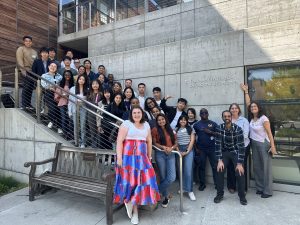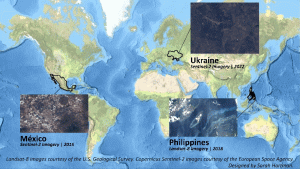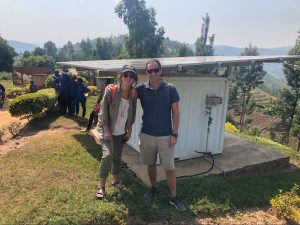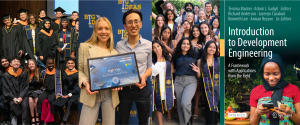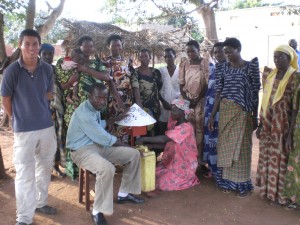
Major: Industrial Engineering and Operations Research
Location and date of Field Experience: Uganda, Summer 2009
Organization: Engineers for a Sustainable World
Project Description: Improving water quality and reducing disease
Hometown: Redlands, CA
Current Location: Rwanda
Quote: I am driven to bridge the gap between people and their dreams.
What did you do for your practice experience?
There were two projects:
Project #1: We launched a safe water pots program. The village was storing their drinking water in ceramic pots, which helped to keep it cool, but when they went to scoop water out of the pots with a cup, if they touched the water, it was very possible it would be contaminated. We designed a pot with a spigot to limit that contamination.
Project #2: We installed chlorine dispensers next to the wells where the villagers pumped their water. The dispensers dropped 1 ml of chlorine into a bucket of water to kill of any bacteria in it. I thought this project was more interesting than the first one because we got the opportunity to work with the entire village. We had to find a way to communicate that this was a project that would require everyone to pitch in with and learn how to use.
It’s been really amazing to see this project ramp up. We started off installing 5 dispensers in Uganda and currently, the same organization is working on a project to instal 1,000 dispensers in Kenya.
Describe an inspiring person you met during your practice experience.
Our translator Edward became very close to our team. I remember one night, it was a beautiful night in Uganda and you could see all the stars– but he was telling me about his dream to start a primary school. He had gone to the university, gotten his education and had all of these ideas about how he could make a great school to educate the youth in the area. He was trying to get the money to do it and had applied to the government to get the seed money to start this school, but was having no luck.
Here I was, standing next to this man with a great education, a great heart and a passion for wanting to help people, but he couldn’t get his idea off of the ground because there was just no legitimate opportunity for him to access the capital to get it off the ground. That had a huge impact on me– he was someone with so much potential to do great things, but he was entirely limited by his environment and access to opportunity. It got me thinking about how so many people that I meet have dreams and the drive to accomplish them, but because of external factors, they may never be able to get there. We talk a lot about gaps we’re trying to bridge, but Edward made me realize that I am driven to try to bridge that gap– the one between people and their dreams.
If you had one piece of advice for current Global Poverty and Practice minors, what would it be?
I don’t remember all of the facts or the numbers about how many people in India don’t have access to clean water… But the two things I value and will remember most from the minor are:
- The importance of educating yourself– the first step to make change is to understand what the problem is and to help other people understand that issue as well. I think I was really naive as a college student. I thought, “I’ve got a great engineering education, maybe I can help make a difference for poor people in the world,” but after working on my project for two months and getting a feel for how things work, I realized that empowering and helping people get out of poverty is incredibly difficult. It takes a lot of time and a lot of work. Change is not easy. Progress is not easy.
- The other people in the minor– the GPP minor is filled with like-minded people who are all incredibly passionate about trying to understand a certain bubble of the world. I enjoyed how my perspective on the problems of the world changed. I loved being around passionate, driven people who wanted to genuinely enact change.
One thing college grads should understand is that its difficult to break into the development field and actually apply what you’re studying, but at the end of the day it’s possible if you stick to what you’re interested in.

